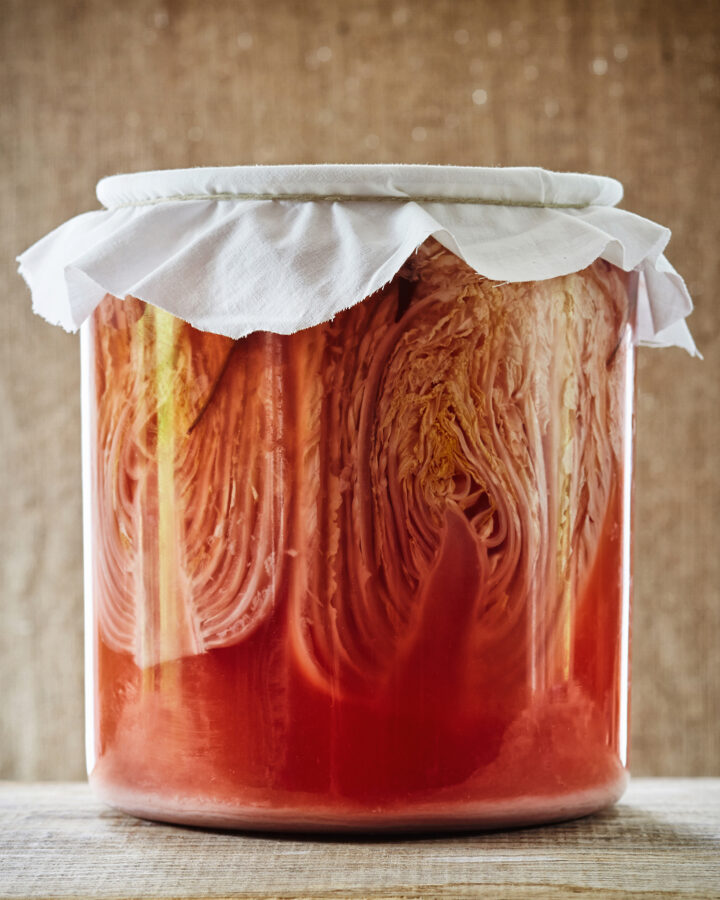The New Longevity Pantry: Science-Backed Staples for a Longer Life

Food can be a form of personalized medicine. And the pantry? That’s your front line.
We know that what you eat can help modulate [in-fluh-mey-shuhn]nounYour body’s response to an illness, injury or something that doesn’t belong in your body (like germs or toxic chemicals).Learn More, optimize metabolic function, support cognitive [ri-zil-yuhns]nounThe ability to recover quickly from stress or setbacks.Learn More, and even influence your biological age. With global chronic disease rates rising, the conversation has shifted from calorie counts to cellular health. Your kitchen is a major player in how you shape your [helth-span]nounThe number of years you live in good health, free from chronic illness or disability.Learn More.
So, what belongs in a pantry built for [lon-jev-i-tee]nounLiving a long life; influenced by genetics, environment, and lifestyle.Learn More?
The New Longevity Pantry
We dug into the research and created a simple science-backed overview of the New Longevity Pantry: functional staples, strategic upgrades, and a few swaps to consider.
The Omega Shelf: Fat That Fights Inflammation
- What to stock: Extra virgin olive oil, flaxseed, walnuts, chia seeds, sardines.
- Why it matters: Healthy fats are critical for cardiovascular and cognitive function. They reduce systemic inflammation, which is a key driver of aging, and support cellular membranes.
- Science says: Diets rich in extra virgin olive oil (like the Mediterranean diet) are associated with reduced risk of Alzheimer’s and cardiovascular disease. A study in the Journal of the American College of Cardiology found that people with the highest olive oil intake had a 19% lower risk of cardiovascular mortality, 17% lower risk of cancer mortality, 29% lower risk of neurodegenerative mortality and 18% lower risk of respiratory mortality.
The Fiber Bin: Prebiotic Fuel
- What to stock: Leafy greens (arugula, collards, spinach, romaine, chard, etc), lentils, oats, barley, psyllium, beans.
- Why it matters: Fiber feeds beneficial gut bacteria that produce short-chain fatty acids (SCFAs), which reduce inflammation and may protect against neurodegeneration.
- Science says: High-fiber diets are associated with reduced risk of cognitive decline and dementia. A 2023 study in Nutritional Neuroscience showed that dietary fiber intake was inversely associated with Alzheimer’s risk. (Try the Super Age Spinach Salad.)
The Plant-Protein Corner: Clean Power
- What to stock: Tempeh, tofu, lentils, quinoa, hemp seeds.
- Why it matters: Plant proteins are metabolically efficient, low in saturated fat, and may help modulate IGF-1 and mTOR, key longevity pathways.
- Science says: Replacing animal protein with plant-based protein (even just a few times a week) is associated with lower [awl kawz mawr-tal-i-tee]nounThe risk of death from any cause.Learn More. In a 2019 JAMA Internal Medicine study, replacing just 3% of calories from red meat with plant protein was linked to a 10% lower risk of death.
The Polyphenol Zone: Antioxidant Abundance
- What to stock: Berries, green tea, turmeric, dark chocolate (70%+), colorful herbs.
- Why it matters: [pol-ee-fee-nawlz]nounPlant compounds that act as antioxidants.Learn More are plant compounds with antioxidant, [an-tee-in-flam-uh-tawr-ee]adjectiveReducing inflammation, which contributes to better overall health.Learn More, and even senolytic potential.
- Science says: A BMC Medicine study found that high polyphenol intake was associated with a 37% reduction in all-cause mortality compared to those who get the least amount.
The Food-As-Vitamin Cabinet: Tiny Nutrients, Big Impact
- What to stock: Pumpkin seeds, Brazil nuts, and salmon
- Why it matters: Midlife deficiencies in micronutrients like magnesium, selenium, and [vai-tuh-min dee]nounA vitamin essential for bone health and immune function.Learn More are linked to immune dysfunction, cardiovascular issues, metabolic issues, and cognitive decline.
- Science says: A 2019 review in The Journal of Environmental Research and Public Health concluded that vitamin D deficiency was associated with increased all-cause mortality. A 2023 study shows magnesium-rich diets may slow brain aging by over a year.
The Smart Carb Shelf: Blood Sugar-Friendly Staples
- What to stock: Sweet potatoes, steel-cut oats, wild rice, black rice.
- Why it matters: These carbs provide sustained energy, fiber, and antioxidants without spiking insulin, which is key for metabolic health.
- Science says: Low glycemic index diets are associated with reduced risk of type 2 diabetes and cardiovascular disease, while high glycemic diets are associated with increased risk of death from cardiovascular causes, according to a NEJM study.
The Fermentation Station: Gut-Health Gold
- What to stock: Kimchi, kefir, sauerkraut, miso, natto.
- Why it matters: Fermented foods promote gut [mahy-kroh-bahy-ohm]nounThe community of microorganisms (bacteria, viruses, fungi) living in a particular environment, especially the gut.Learn More diversity, which impacts immune resilience, metabolic function, and mood.
- Science says: A 2021 study in Cell found that fermented foods increase microbiome diversity and lower inflammatory markers in humans. And a study in the British Journal of Nutrition found that only fermented vegetable intake was associated with a reduced risk of all-cause mortality.
The Beverage Bar: Longevity Drinks That Deliver
- What to stock: Green tea, coffee (filtered or espresso-style), kombucha (low-sugar), water with electrolytes.
- Why it matters: These drinks offer concentrated sources of polyphenols, postbiotics, and metabolism-boosting compounds. They support cardiovascular, cognitive, and metabolic health when used in place of sugary or ultra-processed beverages.
- Science says: Green tea is linked to up to 40% lower cardiovascular and all-cause mortality in multiple long-term cohort studies. Coffee consumption is associated with a 10–15% reduction in all-cause mortality, likely due to its polyphenols and metabolic benefits. Kombucha has shown early evidence for lowering fasting blood glucose and improving insulin response. Hydration plays a critical role in healthy aging. A 2023 longitudinal analysis found that middle-aged adults with optimal serum sodium levels (between 135 and 146 mmol/L), which is a marker of good hydration, had a 39% lower risk of developing chronic disease and appeared up to 15 years biologically younger than those chronically underhydrated.
What’s Not in the Pantry
You won’t find ultra-processed snacks, sugary drinks, or excessive red meat. These accelerate inflammation and oxidative stress, which are two hallmarks of accelerated aging. It’s not about restriction. It’s about creating a pantry that energizes, heals, and sustains you.
Build Your Own Longevity Pantry
Longevity doesn’t live in a single [soo-per-food]nounA nutrient-rich food that offers health benefits.Learn More. It’s in the pattern: colorful plants, high-fiber carbs, clean fats, and microbial allies.
Here’s how to get started:
- Add one new fermented food this week.
- Swap processed snacks for nuts, seeds, fruit, or roasted chickpeas.
- Try a breakfast with oats, berries, and ground flax.
The kitchen is your laboratory. The pantry is your pharmacy. And your future self? They’ll thank you for every choice you make.
How to Eat For Longevity Every Day
Eating mostly plant-based, nutrient-dense foods is one of the most powerful lifestyle choices for extending healthspan and lifespan. Here’s what you should aim for:
- 5 Daily Servings of Green Leafy Vegetables
- 4 Daily Servings of Whole Fruit
- 5 to 6 Servings of Whole Grains
- 1 Daily Serving of Nuts, Legumes, and Plant-Based Proteins
- Mix in safe fats from olive oil
- Include fermented foods like kimchi, miso, and sauerkraut for gut health
- Minimize red and processed meats, refined sugars, and ultra-processed foods
This diet is consistent with the best research on dietary patterns for longevity. It mirrors the Mediterranean diet (widely proven to enhance health and lifespan) and the common practices of long-lived populations. This kind of whole-food, plant-forward eating pattern supplies ample nutrients and fiber that defend against chronic diseases, supports a healthy gut microbiome, and keeps inflammation low, all of which are critical factors in healthy aging and longevity.
Read This Next
The information provided in this article is for educational and informational purposes only and is not intended as health, medical, or financial advice. Do not use this information to diagnose or treat any health condition. Always consult a qualified healthcare provider regarding any questions you may have about a medical condition or health objectives. Read our disclaimers.

